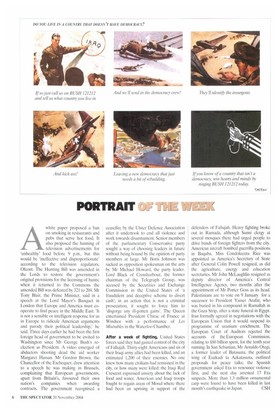A white paper proposed a ban on smoking in restaurants and
pubs that serve hot food. It also proposed the banning of television advertisements for 'unhealthy' food before 9 p.m., but this would be 'ineffective and disproportionate' according to the television regulators, Ofcom. The Hunting Bill was amended in the Lords to restore the government's original provisions for the licensing of hunts; when it returned to the Commons the amended Bill was defeated by 321 to 204. Mr Tony Blair, the Prime Minister, said in a speech at the Lord Mayor's Banquet in London that Europe and America must cooperate to find peace in the Middle East: 'It is not a sensible or intelligent response for us in Europe to ridicule American arguments and parody their political leadership,' he said. Three days earlier he had been the first foreign head of government to be invited to Washington since Mr George Bush's reelection as President. A video emerged of abductors shooting dead the aid worker Margaret Hassan. Mr Gordon Brown, the Chancellor of the Exchequer, drew attention to a speech he was making in Brussels, complaining that European governments, apart from Britain's, favoured their own nation's companies when awarding contracts. The government recognised a
ceasefire by the Ulster Defence Association after it undertook to end all violence and work towards disarmament. Senior members of the parliamentary Conservative party sought a way of choosing leaders in future without being bound by the opinion of party members at large. Mr Boris Johnson was sacked as opposition spokesman on the arts by Mr Michael Howard, the party leader. Lord Black of Crossharbour, the former chairman of the Telegraph Group, was accused by the Securities and Exchange Commission in the United States of 'a fraudulent and deceptive scheme to divert cash'; in an action that is not a criminal prosecution, it sought to force him to 'disgorge any ill-gotten gains'. The Queen entertained President Chirac of France at Windsor with a performance of Les Miserables in the Waterloo Chamber.
After a week of fighting, United States forces said they had gained control of the city of Fallujah. Thirty-eight Americans and six of their Iraqi army allies had been killed, and an estimated 1,200 of their enemies. No one knew how many civilians had remained in the city, or how many were killed; the Iraqi Red Crescent expressed anxiety about the lack of food and water. American and Iraqi troops fought to regain areas of Mosul where there had been an uprising in support of the defenders of Fallujah. Heavy fighting broke out in Ramada, although Sunni clergy at several mosques there had urged people to drive bands of foreign fighters from the city. American aircraft bombed guerrilla positions in Baquba. Miss Condoleezza Rice was appointed as America's Secretary of State after General Colin Powell resigned, as did the agriculture, energy and education secretaries, Mr John McLaughlin resigned as deputy director of America's Central Intelligence Agency, two months after the appointment of Mr Porter Goss as its head. Palestinians are to vote on 9 January for a successor to President Yasser Arafat, who was buried in his compound in Ramallah in the Gaza Strip, after a state funeral in Egypt. Iran formally agreed in negotiations with the European Union that it would suspend its programme of uranium enrichment. The European Court of Auditors rejected the accounts of the European Commission, relating to £60 billion spent, for the tenth year running. In San Sebastian, Mr Arnaldo Otegi, a former leader of Batasuna, the political wing of Euzkadi ta Azkatasuna, outlined proposals for peace talks; the Spanish government asked Eta to renounce violence first, and the next day arrested 17 Eta suspects. More than 1.3 million ornamental carp were found to have been killed in last month's earthquake in Japan. CSH


























































































 Previous page
Previous page